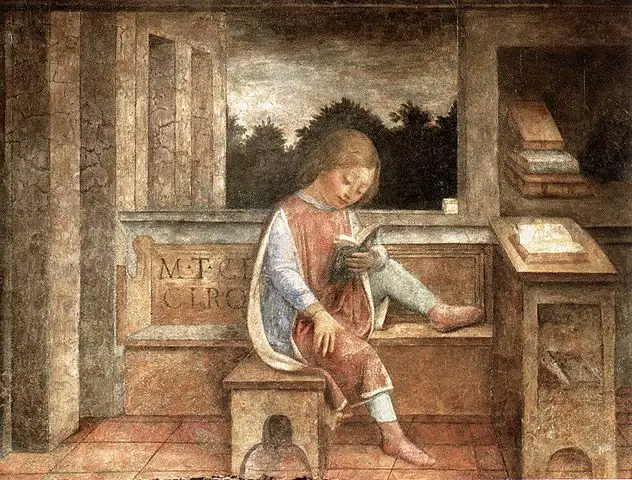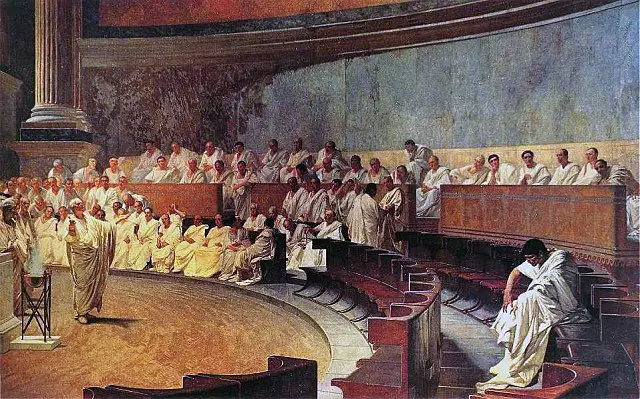Some say Cicero was the greatest Roman speaker of all time. He was also a brilliant lawyer.
He wrote speeches and letters that were referred to by major thinkers in Rome and other countries for decades. Cicero was a leading political figure during the reign of Julius Caesar.
He suffered being exiled and then murdered but his writings were influential for centuries after his death.

Early Life
Marcus Tullius Cicero was born in a town southeast of Rome. The family was wealthy due to the father being a member of ‘the equestrian order of Rome’, which was an elite part of Roman society.
As they could afford the best, Cicero’s education was in philosophy and in the art of speaking and writing.
Cicero served briefly in the military after which he studied Roman law. He argued his first case in 81 BC and won the freedom of a man accused of murdering one of his family members.

Politics
He quickly rose through the ranks of politics: became a quaestor (public official) in 75 BC, a praetor (judge) in 66 BC, and a consul (Chief Magistrate) in 63 BC.
He was the youngest man ever who was not of a political family to attain the rank of consul, the highest position in the government of Rome.

Exile and Death
Cicero made a critical mistake when he made speeches to the Senate accusing Catiline, one of the Senators, of conspiring to overthrow the Roman government and of bribing other Senators to support him.
These speeches were apparently against Roman law, and Cicero was sent into exile.
While Cicero was in exile, Julius Caesar asked him to join the First Triumvirate, an agreement between Caesar, Pompey, and Marcus Crassus. Cicero refused but returned to Rome.
When the civil war began between Caesar and Pompey, Cicero decided to back Pompey.
Caesar won the war by pushing Pompey and his troops out of Italy and into Egypt where Pompey was killed. Cicero was exiled again.
Cicero did not join the conspiracy group that assassinated Julius Caesar in 44 BC but he celebrated the murder.
There were many fights within the Senate after Caesar’s death and Cicero tried many times to align himself with key figures in government.
He defended Mark Antony in front of the Senate and then declared Antony an enemy of the people of Rome.
The Second Triumvirate was formed in 43 BC by the joining of forces of Mark Antony, Octavian, and Lepidus.
Because Antony was furious with being called an enemy of the people by Cicero, Antony sent his soldiers to cut off Cicero’s head and then displayed it in front of the people of Rome.
Cicero’s Writings and Speeches
Many of Cicero’s speeches, letters, and writings have survived to today. Cicero was intensely influenced by Greek philosophy. He valued virtue and service in all his dealings with the Roman government.
He translated Greek philosophical writing into Latin, which were used in teaching textbooks and grammar for generations.
Many historians claim the beginning of the Renaissance in 1345 AD to the letters of Cicero. Modern philosophers still use the words of Cicero to explain various philosophical ideas.
Questions:
- What kind of education did Cicero receive?
- Who ruled the Roman Empire when Cicero began practising law?
- What positions did Cicero hold between 75 and 63 AD?
- What event caused Cicero to be exiled the first time?
- Why was Cicero murdered by members of Antony’s army?

Answers:
- Cicero was educated in philosophy and the art of speaking and writing.
- When Cicero began practising law, Julius Caesar ruled the Roman Empire.
- Cicero held the position of quaestor (public official), praetor (judge), and consul (Chief Magistrate) between the years 75 and 63 BC.
- Cicero was exiled the first time because he accused a Senator of conspiracy and bribery.
- Cicero defended Antony in front of the Senate and then accused Antony of being an enemy of the people. Antony became enraged and sent members of his army to find Cicero and behead him and bring his head to be displayed publicly to all of Rome.